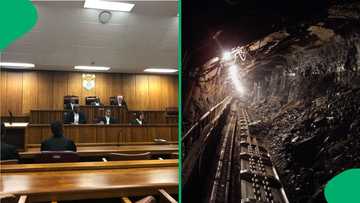Ukraine’s Spirit Shines Through in Historical Injustices SA Overcame After 1,000 Days’ Resistance
- Ukraine has continued to sustain heavy bombardment amid the Russo-Ukrainian War, which began on 20 February 2014
- Essential infrastructure has borne the brunt of the continuous strikes, which, on 19 November 2024, had not ceased in 1,000 days
- The Ambassador of Ukraine to SA, Liubov Abravitova, acknowledging Ukraine's resistance, drew parallels with SA's oppressive past

Source: Getty Images
KYIV — Ukraine on Tuesday, 19 November 2024, marked 1,000 days of resistance against full-scale rocket, drone and artillery strikes amid ongoing attacks.
Schools, hospitals, churches, kindergartens, museums, and other essential infrastructure have borne the brunt of enemy fire.
Ukraine's spirit shines through SA
After the Kremlin renewed its warring campaign on 23 February 2022, thousands of Ukrainian citizens suffered unimaginable violations.
PAY ATTENTION: Briefly News is now on YouTube! Check out our interviews on Briefly TV Life now!
However, while countless existing international laws have since been shattered, Ukraine has stood firm.
Russian special forces, reportedly without insignias, first invaded Ukraine on 20 February 2014. Later, troops, again without any chevrons, intervened in Ukrainian Donetsk and Luhansk, and five months later, three militants from Donetsk tortured and killed 16-year-old youth football player Stepan Chubenko.
He'd reportedly been detained for wearing a blue and yellow ribbon on his backpack — the colours of the Ukrainian national flag.
Artem, another Ukrainian teenager, was detained and forcibly taken to an orphanage in Perevalsk, a temporarily occupied settlement in the Luhansk region. For six harrowing months, he endured appalling conditions.
But unlike Stepan, his ordeal — during which he was forced into a Russian family's adoption — ended when he was rescued and reunited with his family in March 2023.
Fight to free the children
Artem's story is one of about 19,500 documented cases of children who fortuitously survived Russian shells.
"But not lucky enough to avoid forceful deportation."
This is according to Ambassador of Ukraine to South Africa Liubov Abravitova, who said the harrowing ordeals Stepan and Artem endured constituted thousands of gruesome documented atrocities.
"A diplomatic grouping created in June 2014 for a peaceful resolution, the Normandy Format, and the Minsk Agreements — a series of international agreements which sought to end the Donbas war — are believed to have brought Russia back to international law frameworks.
"However, after about 200 talks and ten ceasefire agreements concluded, Russia significantly increased its military spending.
"In 2021, Russia's military budget grew by 2.9% compared to 2020, reaching 4.1% of gross domestic product (GDP) and amounting to $66 billion," said the Secretary.
Genocidal plan gaining momentum
She described the Russian Federation's system of abducting Ukrainian children as calculated and deeply troubling.
Both unaccompanied and accompanied children are targeted in this cruel operation, which involves systematically forced transfers and deportations through filtration camps, foster placements, and adoptive families.
"These actions are carried out with the direct involvement of state actors, bolstered by legal frameworks designed to erase and replace the children's identities," said Abravitova.
"This grim machinery operates amid widespread violations of children’s fundamental rights. It has been a harrowing pattern of deliberate and systemic efforts to sever them from their roots, depriving them of their heritage and future within their homeland. It also violates dignity and is a painful reminder of the heavy toll on the most vulnerable in wartime."
In solidarity, we stand united
The politician said Ukraine considered SA its ally, given the country's racially oppressive past, and understood the pain of Ukranians.
Abravitova drew stark parallels between the persecution the countries' youth had faced amid relentless, systematic injustices.
"When I think of Stepan and Artem, I recall Hastings Ndlovu, 15, and Hector Pieterson, 12, both brutally killed during the Soweto Uprising [on 16 June 1976] because of their claim of the fundamental right to their nationality.
"The 176 killings [then] impacted the world significantly, resulting in continuous support from the international community to oppressed African nations, including South Africa, celebrating 30 years of democracy after 43 years of the inhumane apartheid regime.
"And now, we rely on the international community to stop the horrific terror attacks against our children and renew historical justice. As stated powerfully in the Ubuntu philosophy, 'I am because you are,' which corresponds with our national proverb, 'There are no strangers' kids.”

Read also
Gauteng High Court orders Stilfontein mine shaft unblocking for illegal miners to return to surface
She said that the Embassy appreciated South Africa's continuous participation in the national security advisers meeting for peace proposals in Ukraine.
"In this, we feel solidarity with Ukrainian families whose children were stolen. The continuous terror, hybrid for ten years and full scale for 1,000 days must be stopped. All peace-loving countries must act now for a better future for all children and humanity.
"We believe that all peace-loving nations shall support us in this endeavour for the sustainable future of their generations, especially during South Africa's presidency of the G20 Summit [in 2025]."
Russia bombs Ukraine's grain stores
In related news, Briefly News reported that airstrikes at the Black Sea Port in Odesa on Monday, 25 September 2023, destroyed Ukraine's storage facilities.
Economy Minister Yulia Svyrydenko said this had dealt a massive blow to dozens of countries that depend on Kyiv's grain to meet shortages after significant damage to the seaport.
Source: Briefly News




